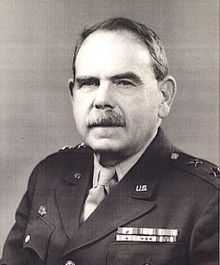Edward P. King
| Edward Postell King | |
|---|---|
 General Edward King | |
| Born |
July 4, 1884 Atlanta, Georgia |
| Died |
August 31, 1958 (aged 74) Brunswick, Georgia |
| Place of burial |
Cemetery of St. John in the Wilderness Episcopal Church Flat Rock, NC |
| Allegiance |
|
| Service/branch |
|
| Years of service | 1908 – 1946 |
| Rank |
|
| Commands held | Commanding General, Northern Luzon |
| Battles/wars |
World War I World War II |
| Awards | Distinguished Service Medal (2) |
Edward Postell King Jr. (July 4, 1884 – August 31, 1958) was a Major General in the United States Army who gained prominence for leading the defense of the Bataan Peninsula in the Battle of Bataan against the Japanese invasion of the Philippines in World War II.
Education
King was born in Atlanta, Georgia in 1884. As the grandson and nephew of Confederate soldiers during the American Civil War, King had a strong desire to be a soldier. He entered the University of Georgia, where he was a member of the Phi Delta Theta fraternity and graduated in 1902.
Early military career
Initially his family wanted him to be a lawyer but he desired a more adventurous career. He applied for and received a commission in the Army in 1908. He served with distinction during World War I, earning the Distinguished Service Medal. The President on 9 July 1918 authorised awarding the Army DSM to Major King, for exceptionally meritorious and distinguished services in a duty of great responsibility during World War I. As Principal Assistant to the Chief of Field Artillery, from 23 March 1918 to 11 November 1918, Major King contributed largely to the successful solution of the difficult problems of expansion, organization, and training which then confronted the Field Artillery. Between World War I and World War II, King held several important assignments including that of instructor in both the Army and Navy War Colleges. In 1940 he was sent to the Philippines where he was promptly promoted to Brigadier General; he served as General Douglas MacArthur's second highest ranking ground officer, after General Jonathan Wainwright.
World War II
On 11 March 1942, by order of President Franklin D. Roosevelt, MacArthur left for Australia. Wainwright was appointed to succeed MacArthur as General of the Armies of the Philippines while King became the Commanding General of the Philippine-American forces on the Bataan Peninsula. At the time, King was the commander of the artillery.
After months of fighting the invading Japanese Army and with food and medicine exhausted, King himself, accepting sole responsibility to disobey MacArthur's and Wainwright's orders, chose to surrender his troops on 9 April 1942. (This day is commemorated in the Philippines as Araw ng Kagitingan "Day of Valor"). A combined American and Filipino force of over 75,000 surrendered; this was the largest surrender of a military force in American history. Thousands of these soldiers would die under Japanese captivity during the ensuing Bataan Death March and imprisonment.
Wainwright and his men, numbering 10,000, held on to Corregidor until they too were forced to surrender on 6 May 1942.
King spent three and half years as a captive of the Japanese and was often mistreated by them because of his rank. Both Wainwright and King expected court-martial for disobeying the no-surrender order. However, they were treated as heroes when they were finally freed.
Decorations
| 1st Row | Army Distinguished Service Medal w/ OLC | World War I Victory Medal | World War II Victory Medal | ||||||
|---|---|---|---|---|---|---|---|---|---|
| 2nd Row | American Defense Service Medal with base clasp | Asiatic-Pacific Campaign Medal w/ 3 service stars | Philippine Defense Medal | ||||||
Postwar
After the war, he returned to the United States where he retired to a home in Georgia, devoting himself to many volunteer causes, such as the Red Cross. He died in 1958, and is buried at the Cemetery of St. John in the Wilderness Episcopal Church – Flat Rock, NC.[1]
See also
References
- ↑ Cemetery of St. John in the Wilderness Episcopal Church by Mosley Hardy. (GigaPan)
- "The Battling Bastards of Bataan" Profile
- "King of Bataan". Thaddeus Holt. The Quarterly Journal of Military History 7:2 (1995)